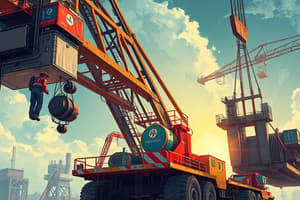Podcast
Questions and Answers
What are the potential consequences of failing to comply with LOLER 1998?
What are the potential consequences of failing to comply with LOLER 1998?
- Enhanced equipment performance
- Legal consequences and serious accidents (correct)
- Increased productivity
- Decreased maintenance costs
Who is required to be competent to supervise or operate lifting equipment according to LOLER 1998?
Who is required to be competent to supervise or operate lifting equipment according to LOLER 1998?
- Only individuals with a general understanding of equipment
- Individuals with administrative skills
- Individuals with first aid training
- Anyone involved in lifting operations (correct)
What actions can the HSE take in response to non-compliance with LOLER 1998?
What actions can the HSE take in response to non-compliance with LOLER 1998?
- Issuing improvement notices (correct)
- Revoking business licenses
- Providing financial incentives
- Offering free equipment upgrades
What is the purpose of regular refresher training for those involved in lifting equipment operations?
What is the purpose of regular refresher training for those involved in lifting equipment operations?
Why is LOLER 1998 significant in the UK regarding lifting operations?
Why is LOLER 1998 significant in the UK regarding lifting operations?
What is the main purpose of LOLER 1998?
What is the main purpose of LOLER 1998?
Who enforces LOLER 1998?
Who enforces LOLER 1998?
What does LOLER 1998 require regarding lifting equipment maintenance?
What does LOLER 1998 require regarding lifting equipment maintenance?
According to LOLER 1998, who should oversee lifting operations?
According to LOLER 1998, who should oversee lifting operations?
Under LOLER 1998, what must be prepared before a lifting operation begins?
Under LOLER 1998, what must be prepared before a lifting operation begins?
What determines the inspection frequency of lifting equipment according to LOLER 1998?
What determines the inspection frequency of lifting equipment according to LOLER 1998?
Flashcards are hidden until you start studying
Study Notes
LOLER 1998: Lifting Operations and Lifting Equipment Regulations
The Lifting Operations and Lifting Equipment Regulations (LOLER) 1998 is a UK legislation that sets out the requirements for the safe use of lifting equipment and the inspection and maintenance of equipment used for lifting loads. This regulation is part of the Health and Safety at Work etc. Act 1974 and is enforced by the Health and Safety Executive (HSE).
Key Requirements
LOLER 1998 requires that all lifting equipment used in the UK must be safe and in a good condition. The regulation applies to both lifting equipment that is permanently installed on a site and to equipment that is transportable. It also covers the inspection and maintenance of lifting equipment.
Lifting Operations
LOLER 1998 sets out requirements for the safe planning and supervision of lifting operations. This includes the use of competent personnel, the use of appropriate equipment, and the preparation of a method statement before the lifting operation begins.
Inspection and Maintenance
LOLER 1998 requires that lifting equipment must be inspected regularly to ensure it is safe to use. The inspection frequency depends on the type and use of the equipment. The regulation also requires that any defects found during inspections must be reported and rectified.
Enforcement
LOLER 1998 is enforced through inspections and investigations by the HSE. The HSE can issue improvement or prohibition notices to address non-compliance with the regulations. Failure to comply with LOLER 1998 can result in legal action against individuals or companies.
Training and Competence
LOLER 1998 requires that anyone who supervises or operates lifting equipment must be competent to do so. This includes training on the safe use of equipment and regular refresher training.
Impact and Consequences of Non-compliance
Failure to comply with LOLER 1998 can lead to serious accidents and injuries, as well as legal consequences. The regulation is in place to ensure the safety of those using lifting equipment and to protect against the risk of injury or death.
In conclusion, LOLER 1998 plays a crucial role in ensuring the safety of lifting operations and equipment in the UK. It sets out the requirements for the inspection, maintenance, and operation of lifting equipment, and enforces these requirements through inspections and investigations.
Studying That Suits You
Use AI to generate personalized quizzes and flashcards to suit your learning preferences.




